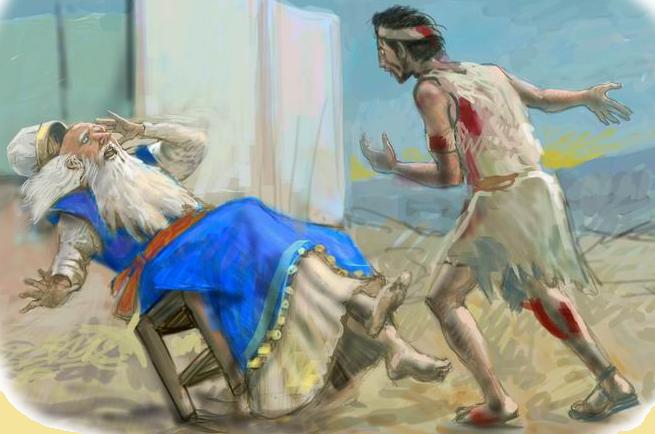The story of Eli and his wicked sons is found primarily in the first few chapters of the book of 1 Samuel. Here are some key scriptures that describe the actions and consequences of Eli’s sons:
- 1 Samuel 2:12: “Now the sons of Eli were worthless men. They did not know the Lord.”
- 1 Samuel 2:22: “Now Eli was very old, and he kept hearing all that his sons were doing to all Israel, and how they lay with the women who were serving in the entrance to the tent of meeting.”
- 1 Samuel 2:29: “Why then do you scorn my sacrifices and my offerings that I commanded for my dwelling, and honor your sons above me by fattening yourselves on the choicest parts of every offering of my people Israel?”
- 1 Samuel 2:34: “And this that shall come upon your two sons, Hophni and Phinehas, shall be the sign to you: both of them shall die on the same day.”
- 1 Samuel 3:11-14: “Then the Lord said to Samuel, ‘Behold, I am about to do a thing in Israel at which the two ears of everyone who hears it will tingle. On that day I will fulfill against Eli all that I have spoken concerning his house, from beginning to end. And I declare to him that I am about to punish his house forever, for the iniquity that he knew, because his sons were blaspheming God, and he did not restrain them. Therefore, I swear to the house of Eli that the iniquity of Eli’s house shall not be atoned for by sacrifice or offering forever.'”
These passages highlight the wickedness of Eli’s sons and the consequences that befell both them and the house of Eli. It showcases the failure of Eli as a father and judge of Israel to restrain his sons and uphold righteousness.
Eli’s sons, Hophni and Phinehas, engaged in several wicked actions that brought judgment upon themselves and their father’s house. Here are some specific examples:
- Disregard for the offerings: Hophni and Phinehas showed disrespect for the offerings brought to the Lord. They would take for themselves portions of the sacrifices that were meant for God, even before the offerings were properly made (1 Samuel 2:12-17).
- Abusing their priestly authority: As priests, Hophni and Phinehas were responsible for overseeing the worship and sacrifices at the tabernacle. However, they abused their position by taking advantage of their authority and mistreating the people who came to worship (1 Samuel 2:22-25).
- Sexual immorality: The sons of Eli engaged in sexual misconduct with the women who served at the entrance to the tabernacle. They took advantage of their position and committed acts of immorality, which further demonstrated their wickedness (1 Samuel 2:22).
- Ignoring their father’s rebuke: Eli, as their father and the high priest, tried to correct his sons and warned them about their wrongdoing. However, Hophni and Phinehas did not listen or heed their father’s rebuke (1 Samuel 2:25).
These actions of Hophni and Phinehas were considered wicked because they violated their priestly duties, showed disrespect for God’s offerings, engaged in sexual immorality, and disregarded the authority and rebuke of their father. These actions demonstrated their lack of reverence for God and their failure to uphold the responsibilities of their priestly office. Lord, may we never resemble Eli’s two sons. May our hearts always be filled with honor, reverence, and deep respect for the God of Israel. May we constantly uphold You in the highest regard and esteem is my prayer!
